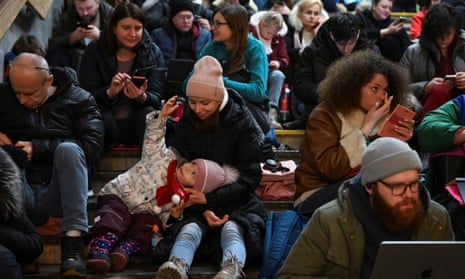Good morning.
Huge explosions shook Kyiv and sirens sounded across Ukraine on Thursday morning during a mass missile attack 24 hours after commitments were made by the US and Germany to send advanced battle tanks. There were reports of at least one person killed in the capital, Kyiv.
The Kremlin spokesperson Dmitry Peskov has this morning said that Moscow views sending tanks to Ukraine as “direct involvement in the conflict”.
A total of 30 missiles were said to be launched against targets in the war-torn country with Ukraine’s air defences having also shot down 24 Iranian-made Shahed “kamikaze” drones overnight.
“We expect more than 30 missiles, which have already started to appear in various territories,” said Yuriy Ignat, a Ukrainian military spokesperson. “Air defence systems are working.”
What has Volodymyr Zelenskiy said? In his nightly address, the Ukraine president praised the commitments and urged allies to provide large quantities of tanks quickly. He said: “The key thing now is speed and volume. The speed of training of our military, the speed of supplying tanks to Ukraine and the volume of tank support.”
What else is happening? Here’s what we know on day 337 of the invasion.
Eight days, 25 dead: California shaken by string of mass shootings
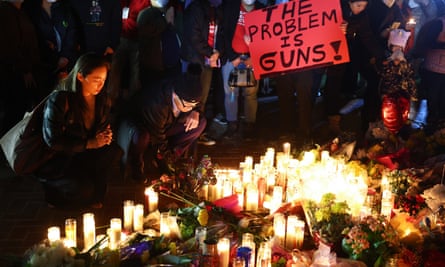
All the names of the dead from one California mass shooting had not yet been released when the news alerts started again on Monday afternoon: there had been another shooting. There was another gunman at large. Seven more people were dead.
Gun violence takes a daily toll in California, but the brutality, scale and pace of the past week has felt different. In the course of just eight days, at least 25 people were killed in four separate mass shootings, defined as any shooting in which at least four people are injured.
The killings – which cut across a big city, a placid Los Angeles suburb, and two small farming towns – have left residents shaken, exhausted and afraid, and led to renewed calls for some kind of fundamental change.
“This proliferation of violence just seems like it’s perpetual,” said Tinisch Hollins, the executive director of Californians for Safety and Justice, an advocacy group for survivors of violence. “It’s so common now to hear of mass shootings that they don’t even stay in the headlines. Not even a day later, we’re talking about an entirely different incident. It’s horrifying.”
Doesn’t California have the strictest gun laws? Yes. In 1989, it became the first state in the nation to ban military-style assault weapons. The state’s per-capita gun homicide rate is lower than the US average. But even California’s Democratic supermajority, which has continued to pass a wide range of new gun regulations, can only do so much in a country where gun rights are fiercely protected.
‘Reckless’: Fury among rights groups as Facebook lifts Trump ban

The news that Meta will allow Donald Trump back on Facebook and Instagram after a two-year ban has been met with fury and indignation among civil rights and online safety advocates.
The former US president will be allowed to return to the platforms “in coming weeks” but “with new guardrails in place to deter repeat offences”, Meta’s president of global affairs, Nick Clegg, wrote in a blogpost explaining the decision on Wednesday.
The Anti-Defamation League, the NAACP, Free Press, Media Matters and other groups expressed concern about Facebook’s ability to prevent any future attacks on the democratic process or quell misinformation.
“Make no mistake – by allowing Donald Trump back on its platforms, Meta is refuelling Trump’s misinformation and extremism engine,” said Angelo Carusone, president and CEO of media watchdog Media Matters for America. “When Trump is given a platform, it ratchets up the temperature on a landscape that is already simmering – one that will put us on a path to increased violence.”
Why was he banned in the first place? Trump was removed from Meta platforms after the Capitol riots on 6 January 2021, during which he posted unsubstantiated claims that the election had been stolen, praised increasingly violent protesters and condemned former vice-president Mike Pence even as the mob threatened his life.
What did Meta say about letting him back on? The company said it will allow Trump to return “in coming weeks” but “with new guardrails in place to deter repeat offenses”. Meta’s president of global affairs Nick Clegg wrote in a blogpost to explain the decision.
In other news …
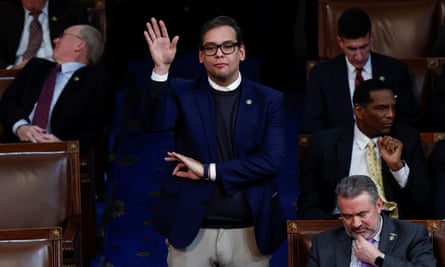
Two House Democrats have written to Republican speaker Kevin McCarthy demanding he deny New York congressman George Santos any opportunity to access classified information because he might be a “significant risk” to US national security. “We urge you to act swiftly to prevent George Santos from abusing his position and endangering our nation,” the letter said.
Pope Francis has criticised laws that criminalise homosexuality as “unjust”, saying God loves all his children just as they are, and calling on Catholic bishops who support the laws to welcome LGBTQ+ people into the church. “Being homosexual isn’t a crime,” Francis said on Tuesday in an interview.
The discovery of classified documents at the home of former US vice-president Mike Pence, following similar incidents involving Joe Biden and Donald Trump, prompt calls to tighten government procedures as Republican congressman says ‘process is broken’.
Srdjan Djokovic, the father of Novak Djokovic, has been pictured posing for photos with Vladimir Putin supporters at the Australian Open last night. In the video, posted by Aussie Cossack on to YouTube, Srdjan Djokovic appears to say “zivjeli Russiyani” or “long live Russian citizens” before he leaves.
A self-styled expert in “seduction” and “masculinity” has been jailed for life for the murder of his ex-girlfriend in a town outside Paris in 2020. Mickaël Philétas, 41, who posted videos online about living the life of an alpha male, was found guilty of stabbing to death his 34-year-old ex-girlfriend.
Stat of the day: $18 a dozen. How did America’s eggs get absurdly expensive?
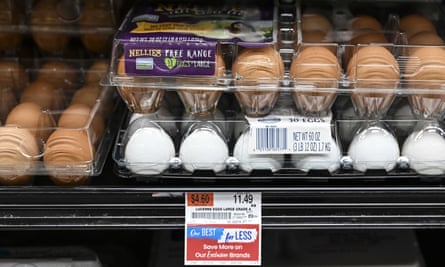
The egg carton has become the symbol of inflation. By the end of 2022, prices had shot up 60% year-over-year putting a strain on holiday budgeting for households across the country. Some Americans got creative with their sourcing. Attempts to smuggle eggs across the US-Mexico border have surged, US Border Patrol says, with the agency reporting that the number of egg and poultry seizures rose 108% from 1 October to 31 December. Shoppers were also seeking out local farms, which can be cheaper. Egg farmers on TikTok have poked fun at this boon, calling themselves “egg dealers”, weighing their produce as if it were a kilo of drugs.
Don’t miss this: The enduring influence of the Gee’s Bend quilters

Anyone who thought abstract art was a club of white, male “lone geniuses” got an unexpected wake-up call in 2002, when quilts from the Alabama hamlet of Gee’s Bend first toured US museums. The quilts’ luscious hues, scissored shapes and improvised visual rhythms garnered comparisons to Paul Klee and Henri Matisse. Their creators were an intergenerational community of African American women who, to this day, work in the tiny conurbation that was once a slave-owner’s plantation. For Legacy Russell, an American feminist theorist and curator, the quilters’ impact has only grown in the last two decades. The New Bend, the travelling exhibition she has curated, explores the legacy of the Gee’s Bend quilters.
Climate check: Can video games change people’s minds about the climate crisis?

Sam Alfred, the lead designer at Cape Town-based video game studio Free Lives is the creator of the new “climate positivity” video game Terra Nil and is part of a burgeoning wave of game makers attempting to both educate players on the dangers of the climate crisis while stretching perceptions of what is possible in response to it. Niantic, the maker of Pokémon GO, has used the real-world setting of its augmented reality game to spearhead a tree-planting initiative. Ubisoft, meanwhile, staged an in-game climate march for Riders Republic players, and is set to unleash a virtual forest fire. The idea with each of these ventures is to use video games as tools of moral instruction. Will it work, and is it enough?
Last Thing: Suspicious death of ‘Pin’ the vulture adds to Dallas zoo’s mysterious woes
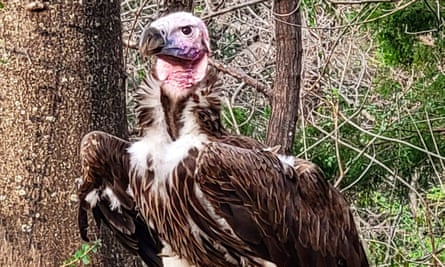
A lappet-faced vulture at the Dallas zoo has died from a suspicious wound in its Wilds of Africa habitat. Officials called the mysterious death of 35-year-old Pin “devastating” and are offering a $10,000 reward for any information. The announcement follows a bout of unusual activity at the zoo. Last week it shut down after it reported one of its two clouded leopards, Nova, was missing. A zoo spokesperson assured the public the 25lb cat didn’t pose a threat to humans and Nova was found later that day on zoo grounds near her habitat. The zoo announced additional cameras and increased overnight security patrols were added throughout the zoo.
Sign up
First Thing is delivered to thousands of inboxes every weekday. If you’re not already signed up, subscribe now.
Get in touch
If you have any questions or comments about any of our newsletters please email newsletters@theguardian.com
